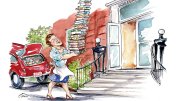1913
Construction is underway on the new Larz Anderson Bridge, connecting Cambridge and Boston, with completion expected before the Yale Game.
1943
Widener Library receives 11,000 books, pamphlets, and periodicals belonging to Theodore Roosevelt, A.B. 1880, LL.D. 1902, including 150 personal scrapbooks and manuscripts, and microfilm copies of thousands of his letters.
1953
Asked to comment on fellow Appleton, Wisconsin, resident Nathan Marsh Pusey ’28, Ph.D. ’37, Senator Joseph P. McCarthy describes Harvard’s president-elect as a “rabid anti anti-Communist” and is promptly chastised by most of the national press.
Student housing remains a problem. Only 10 percent of incoming freshmen are commuters, compared with 25 percent in the 1920s and 15 percent in recent years.
1963
The College Pump reports that “at the exact moment the representative of the Twenty-Fifth Reunion Class presented the imposing Class gift of over a million dollars to President Pusey, a dramatic lighting bolt flashed across the western sky.”
1973
President Derek C. Bok’s name appears on the list of “political enemies” of the Nixon administration submitted to the Senate Watergate committee by John Dean. Possible explanations include Bok’s opposition to the nomination of Judge G. Harrold Carswell to the Supreme Court, and his Washington trip to protest the invasion of Cambodia.
The Department of Health, Education, and Welfare’s Boston office criticizes the University’s affirmative-action plan, specifically the dearth of “a department-by-department breakdown of goals and timetables for the hiring of minorities and women in the Faculty of Arts and Sciences.”
1988
Harvard announces plans to replace the 48-year-old Colonial-style Gulf station at the intersection of Mass. Ave. and Harvard Street with a “moderately priced” 150 to 200-room inn.
1993
Noting that in the past academic year, 64 percent of freshmen had Unix e-mail accounts, but only 42 percent of seniors did, the editors explain, “Computer technology at Harvard is advancing…[so rapidly] that seniors are substantially less computer literate than Yardlings.”








